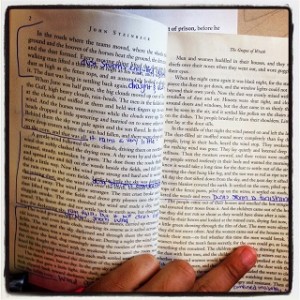Challenge Students With Challenging Text?

The title of a recent piece in The Hechinger Report caught my attention: “Should we tailor difficulty of a school text to child’s comfort level or make them sweat?”
The author of the piece, Annie Murphy Paul, notes that the practice of leveling students’ reading material so that teachers can adjust the difficulty of text to suit the ability and skills of the reader is very popular and has been around for over sixty years. The idea is for teachers to avoid student frustration by giving them only text that is relatively easy to read.
However, proponents of the Common Core are challenging the concept of leveling because it does not give students sufficient practice learning how to read the kinds of challenging, complex text needed to be college and career ready.
In their 2012 Educational Leadership article “The Challenge of Challenging Text”, Shanahan, Fisher, and Frey point out that reading complex text is like lifting weights:
“Just as it’s impossible to build muscle without weight or resistance, it’s impossible to build robust reading skills without reading challenging text. The common core state standards in language arts treat text difficulty as akin to weight or resistance in an exercise program. (p. 1)
Their article goes on to identify what makes text complex (i.e., vocabulary, sentence structure, organization, background knowledge, and how words, ideas, and sentences are connected in text).
Robert Pondiscio addresses the issue in his September, 2014 piece “Leveled Reading: The Making of a Literacy Myth” . He points out that, despite the popularity of leveled readers, there is minimal research to support this practice, but there is research showing the efficacy of instruction with more complex text.
Fisher and Frey revisited the topic in their article “Reading Instruction of Content-Area Texts” (Reading Today, 67 (5), 2014) where they posed these questions:
“We had to ask ourselves, should there be instructional times when students struggle with text? There is evidence that school texts starting in grade 3 have been getting easier. Have our expectations been lowered? Should we focus on scaffolding of complex texts rather than leveling texts, especially in content areas such as social studies, science, and art that require complex thinking about information?”(p. 347)
Given research findings and the fact that we are graduating too many students who cannot read the kind of text they will encounter in post-secondary education and much of the workforce, I personally believe we have an obligation to teach students how to read rich, challenging text.
The emphasis here is on TEACH. That means providing the necessary support to students who struggle to read through explicit instruction and scaffolds that are gradually released as students develop their ability to independently read challenging text. As I work in schools across the country, I encounter teachers who do not have the training to deliver this kind of content literacy instruction. My concern is that content teachers will get the message that they should be using challenging text in science, social studies, math and other subjects, but they will not know how to show students how to read this text. We have to give teachers the tools and knowledge to do this. Otherwise it’s won’t be fair to just “make them sweat”.
I want to end by coming back to Murphy Paul’s piece in The Hechinger Report. She points out that the advent of digital, online reading technology may enable teachers to combine the advantages of both challenging text and leveled reading. This technology makes it possible for the same text to be written to multiple levels of complexity and for students to dial up or down the reading level themselves. An example is Newsela, an online reading program that offers stories about current events.

 Joan Sedita is the founder of Keys to Literacy and author of the Keys to Literacy professional development programs. She is an experienced educator, nationally recognized speaker and teacher trainer. She has worked for over 35 years in the literacy education field and has presented to thousands of teachers and related professionals at schools, colleges, clinics, and professional conferences.
Joan Sedita is the founder of Keys to Literacy and author of the Keys to Literacy professional development programs. She is an experienced educator, nationally recognized speaker and teacher trainer. She has worked for over 35 years in the literacy education field and has presented to thousands of teachers and related professionals at schools, colleges, clinics, and professional conferences.
Leave a Reply